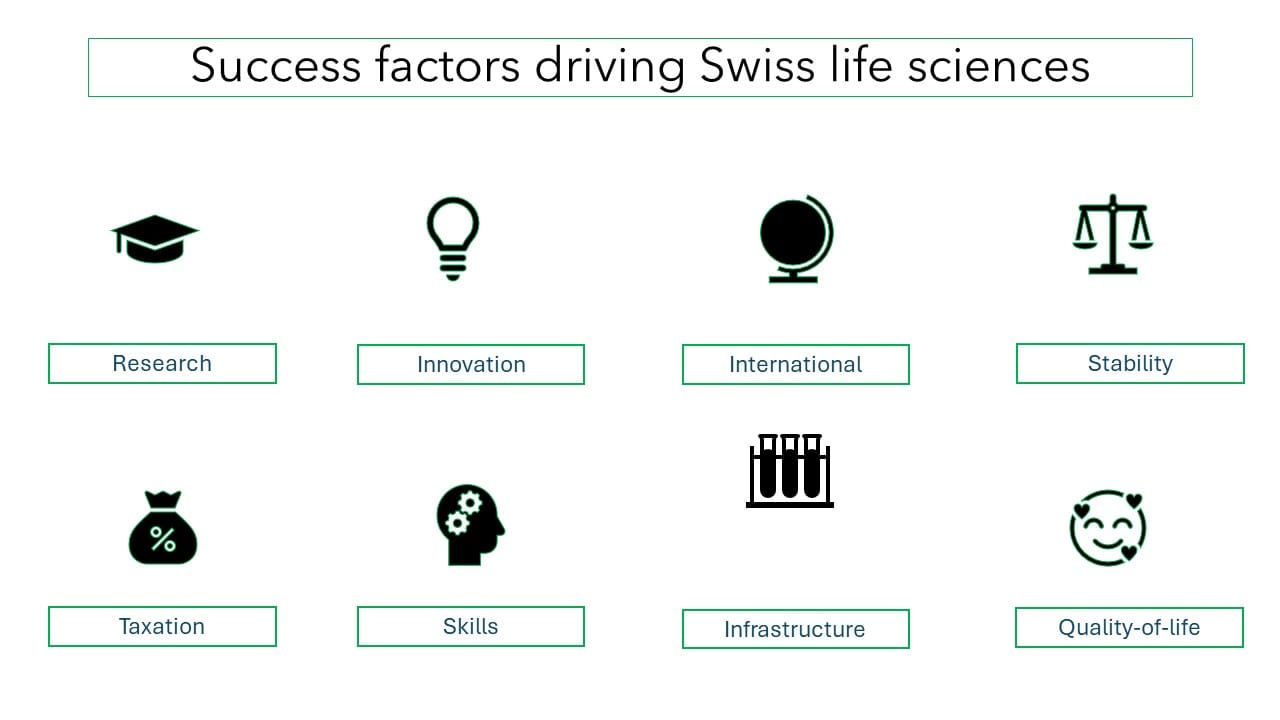The Swiss life sciences model
Switzerland has established itself as a leading life sciences location due to several factors:
- Strong academic and research ecosystem
Swiss universities are known for offering a robust academic environment and promoting innovation between academia and industry. 23 universities are active in life sciences and, in addition, there are the Swiss Federal Institutes of Technology and non-government research institutes. Lastly, Switzerland is at the forefront of medtech research in sectors such as implants, hearing aids, lab instruments and non-invasive surgical systems. - Innovation and entrepreneurship
Switzerland's longstanding tradition of innovation, particularly in life sciences, is supported by a comprehensive ecosystem for start-ups and biotech firms, including venture capital, incubators, and technology transfers. The UN Global Innovation Index has ranked Switzerland the world’s most innovative country for 12 years in a row. - Connection with international organisations
Switzerland's central location in Europe and its proximity to international organisations such as the World Health Organization (WHO) promotes networking in all business fields. Although Switzerland is not an EU member, the EU has closer ties with Switzerland than with any other country outside the European Economic Area (EEA), thanks to a range of bilateral agreements. - Political and economic stability
Switzerland is renowned for its political neutrality, stability, and business-friendly ecosystem. Its steady economy and strong intellectual property protection make it an appealing destination for life sciences companies to establish their presence and invest in R&D. - Favourable tax framework
The legislative environment in Switzerland is also encouraging business ventures. In 2020, the country introduced new tax legislation to authorise Swiss cantons to offer favourable corporate tax rates and incentives to manufacturing and R&D companies. (Note that in Switzerland the federal rate of tax is a flat rate of 8.5 per cent and the cantons’ own rates are in addition.) - Skilled workforce
Switzerland benefits from a highly capable and educated workforce, with a strong emphasis on STEM (Science, Technology, Engineering, and Mathematics) education. The accessibility to talented scientists and professionals in areas such as biotechnology, pharmaceuticals, and medical devices further reinforces its position as a prominent life sciences hub. The staff turnover rate in Swiss pharmaceutical companies is very low, particularly among lab technicians. - Excellent infrastructure
Switzerland offers state-of-the-art scientific infrastructure, including laboratories, clinical trial facilities, and manufacturing plants. - Quality of Life
Switzerland provides an outstanding quality of life and a relatively high standard of living, attracting talent from around the globe. According to the Mercer Quality of Living ranking system, Zurich is the second best city in the world to live in (Vienna is first).

In short, Switzerland's mixture of a strong educational base, pro-active business environment, skilful workforce and quality of life makes it a leader in the global life sciences sector.
The pharmaceutical sector is at the core of the Swiss economy, generating 5.4 per cent of the country’s GDP, a number which rises to 9.2 per cent when related industries are factored in. Switzerland is a net exporter of pharmaceutical products. Medtech contributes 2 per cent to the Swiss GDP and 5.5 per cent total export value. Roche and Novartis, two of the world’s biggest life sciences companies, are Swiss.
What makes Zurich a winning location in life sciences?
Zurich is the largest city in Switzerland and the capital of the Zurich canton, which is responsible for one fifth of Switzerland’s GDP. The Metropolitan Region of Zurich is home to circa 1.7 million people. The city is a financial hub and home to the SIX Swiss Exchange, Switzerland's primary stock exchange. The SIX Swiss Exchange ranks among the world's 20 major stock exchanges. The city is well-connected by air, road, and rail, with Zurich Airport being the main international airport in Switzerland. The public transportation system is first-class, making it easy to move around and outside the city.

